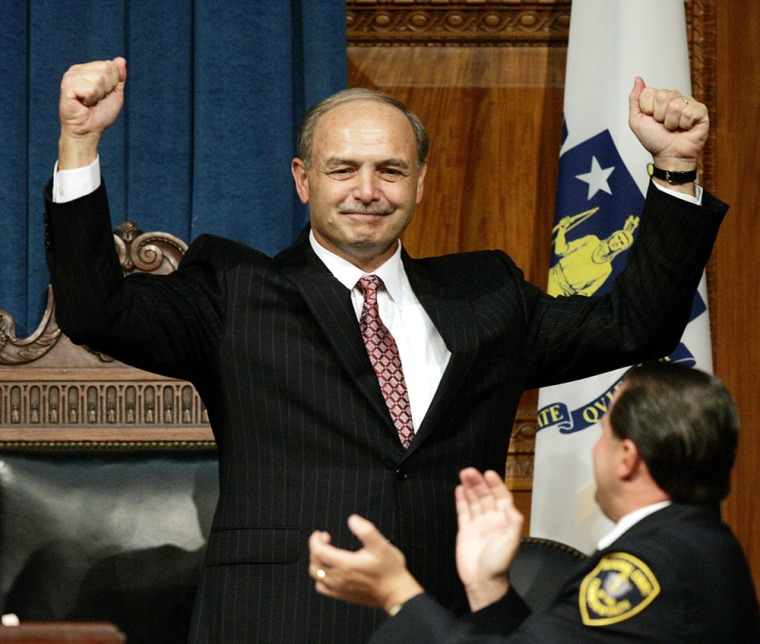In this land of Kennedys, O’Neills, Fitzgeralds and Flynns, where shamrocks grace the jerseys of the basketball team, the Italians are taking over.
With the ascendancy of Salvatore DiMasi to the speakership of the Massachusetts House last week, Italian-Americans hold the two top positions in the state Legislature for the first time in its 224-year history.
“Finally,” said Sheryl Iftikhar (maiden name Spataro), who works at a convenience store in DiMasi’s lifelong home, the city’s North End — a neighborhood where visitors can buy signs that read “Parking for Italians Only.”
DiMasi, who took over from Irishman Tom Finneran, joins Senate President Robert Travaglini, a fellow Boston Democrat who became leader of that chamber in 2003, as well as Boston Mayor Thomas Menino and State Auditor Joe DeNucci in the heights of the state’s power structure.
Last Wednesday, they stood side-by-side as DiMasi made his official debut as the new speaker and listened to a blessing given by the vicar of the Old North Church in DiMasi’s neighborhood.
“I doubt that earlier residents of Massachusetts ... could imagine all the repercussions of hanging two lanterns in the steeple of the Old North Church,” said Vicar Steve Ayres, referring to Paul Revere’s ride. “Nor could they imagine that the two beacons of light now keeping the flame of liberty alive in the North End for the state of Massachusetts would be named DiMasi and Travaglini.”
By the numbers, still more Irish
The Irish remain dominant in Massachusetts, with 23 percent of residents declaring their Hibernian roots in the 2000 census — the highest of any state and far ahead of Italians, who make up 14.5 percent of the population.
Over the years, ties to the Emerald Isle have been seen as a huge political advantage in Massachusetts. So much so that a minor controversy arose last year when a genealogist hired by The Boston Globe revealed that John Kerry is not of Irish descent after all. The Massachusetts senator, whose grandfather was born to Austrian-Jewish parents, says he never claimed Irish ancestry.
While three Italian-Americans have served as governor — most recently Argeo Paul Cellucci — the state’s pantheon of legendary leaders is purely Irish: former U.S. House Speaker Thomas “Tip” O’Neill, Rep. Joseph Moakley of the Irish bastion of South Boston, longtime Boston Mayor James Michael Curley, former state Senate President William Bulger, and President Kennedy and his brother Sen. Edward M. Kennedy.
But the Irish-American grip on power has weakened.
“We’ve got Menino, we’ve got Travaglini, we’ve got DiMasi. What more could we want?” said Johnny “Shoes” Cammarata, presiding in his North End barbershop, Johnny & Gino’s. “It’s a good, good feeling. The Irish had their day. Now it’s our time.”
Irish women, Italian men
The Irish appear to be taking the success of Italian-Americans in stride, comforted by the number of politicians sharing their ancestry who remain prominent in city and state politics. Among them: Boston Council President Michael Flaherty, Judiciary Committee chairman Eugene O’Flaherty, and Boston Police Commissioner Kathleen O’Toole.
“Things goes in cycles,” said John J. Somers, owner of the Green Dragon Irish Pub, who emigrated from County Kerry to Boston in 1971. “But it’s not the nationality that matters. It’s the man. And I think a lot of Irish women have been marrying Italians over the past 50 years, so we still have our influence.”
When immigrants from both countries streamed into Boston in the 19th and early 20th centuries, the Irish at first gained the upper hand. But the divisions have long since evaporated, said DeNucci, 65, the state’s auditor since 1987, who grew up in an Italian enclave in Newton.
“It was a real rivalry growing up,” he said. “We were behind in terms of the Irish because the Italians came here and they couldn’t speak the language. We faced discrimination from the people who were here before us. We were pegged as gangsters. We really never got any credit for any major contributions we made.”
One thing the transition will mean, DiMasi said this week, is that there will be a little more demonstrative affection flowing through the House. DiMasi on Wednesday called the Italians an “emotional breed” and then proved it by embracing nearly ever person he encountered in the House, including Romney — twice.
“I hope you realize when I came in that under my speakership there’s going to be a lot of hugging going on,” DiMasi said.
